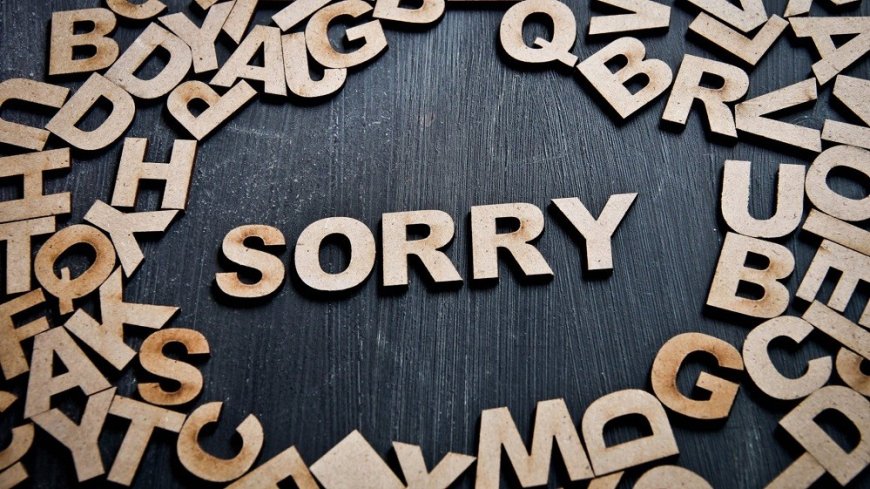Are you apologizing too much too?
apologizing is one of the social bonds that strengthen relationships. However, over-apologizing is a negative thing. apologizing too much.

Essentially, apologizing is one of the social bonds that strengthen relationships. However, over-apologizing is a negative thing. apologizing too much.
Are you apologizing too much too? Apologizing is the binder that improves social relationships. However, apologizing too much can be viewed negatively. Remember that the act of apology should be significant. This means that it should not be a continuous and obsessive activity as it may indicate a lack of self-confidence.
"Sorry to bother you, but may I ask you a question?" "Sorry, but can you put that pen over there?" "Sorry, but I'm careful ..." We could give you thousands of examples of everyday situations where the word "I'm sorry" just flows from the tip of our tongue.
Although apologizing is polite or mannered, doing it all too often is a negative thing. There is only one exaggeration in our world: showing genuine gratitude. However, thanking you is not the same as being truly thankful.
It is the same with forgiveness. You can say "I'm sorry" twenty or more times a day. However, it is always better to only say this when it is really necessary. Let's take a closer look at it.
Do you think you're apologizing too much?
When you say you are sorry for something, you are doing it so that someone will forgive you. Sooner or later, the people around you will get bored of hearing the word from your mouth. Or worse, they'll think you don't have enough confidence to act autonomously. Therefore, as is the case in other areas of life, extremes should be avoided.
Despite evidence of fraudulent activities committed by Volkswagen during exhaust emissions tests of diesel cars, it took him almost a year to apologize publicly. When he finally apologized, it was too late anyway and a good deal of customer confidence was gone.
On the other side of the spectrum, there are people who abuse apologies. Sometimes they do it out of polite or good manners, and others simply out of insecurity. In all cases, they are unaware of the consequences of doing so.
Here are some of them.
This will devalue the goal of forgiveness
Forgiving and asking for forgiveness are two highly therapeutic exercises. They solve conflicts, relieve strain and ease tensions. Few actions involve greater responsibility than admitting guilt and asking forgiveness from the other party.
However, if you spend all day asking forgiveness for unimportant things, the act loses its purpose and meaning.
You are devaluing
Are you apologizing too much? If so, please take a moment to consider your next idea. How do you think others see you every time you apologize for something irrelevant? Some situations don't require an apology. There are several circumstances in which you must ask for forgiveness.
Must Read: The most productive time of the day
You must understand that saying you are sorry does not necessarily mean that you are humble, polite, or respectful. Don't apologize for asking questions, walking around, sitting down, dropping a pencil, asking for help, or breathing. Doing so will increase your self-esteem and confidence.
Asking for forgiveness as a way out of certain situations
Most of us do this: we apologize as if it were a "break out" card to avoid certain situations. There are times when, for some reason, your insecurity or shyness comes to the surface. Think about it.
It is common for people to apologize when addressing a stranger. For example: "Excuse me, may I ask you a question?" or "Excuse me, could you please pass this to me?"
When to apologize and when not to?
If you apologize too much, find out when it is appropriate and when it is not. Working on it will make you feel more competent and confident in any situation and scenario.
When to Ask for Forgiveness
- Apologize if you hurt anyone.
- Do this when you have offended, disappointed, or hurt the other person's feelings.
- Ask for forgiveness when you regret your behavior.
- Be able to ask for forgiveness every time you make a mistake that will affect others.
- Apologize to end disputes and old resentments.
- Learn to ask yourself for forgiveness. We all make mistakes or make wrong choices.
When not to apologize
- Don't apologize when expressing your opinion.
- Avoid apologizing in situations where it does not matter. For example, every time you address someone, you want to ask a question, or you want to take something.
- Don't ask for forgiveness when you need help.
Are you apologizing too much? While sometimes apologizing is necessary, sometimes it should be avoided.
In conclusion, while you've probably heard that only strong people apologize, you need to set limits. Apologizing too much blurs the line between the true and powerful meaning of forgiveness and can affect your self-esteem.
